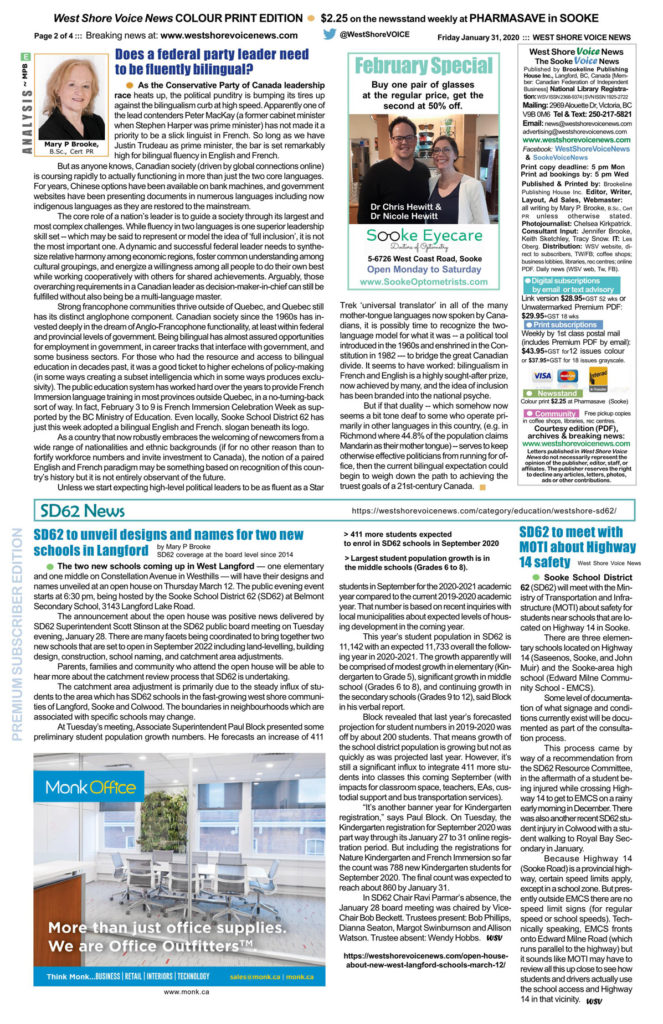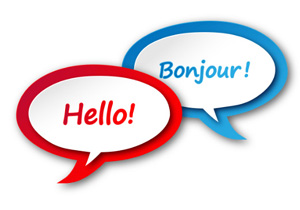Wednesday, February 5, 2020 ~ BC / NATIONAL
EDITORIAL: by Mary P Brooke ~ West Shore Voice News
As the Conservative Party of Canada leadership race heats up, the political punditry is bumping its tires up against the bilingualism curb at high speed. Apparently one of the lead contenders Peter MacKay (a former cabinet minister when Stephen Harper was prime minister) has not made it a priority to be a slick linguist in French. So long as we have Justin Trudeau as prime minister, the bar is set remarkably high for bilingual fluency in English and French.
But as anyone knows, Canadian society (driven by global connections online) is coursing rapidly to actually functioning in more than just the two core languages. For years, Chinese options have been available on bank machines, and government websites have been presenting documents in numerous languages including now indigenous languages as they are restored to the mainstream.
The core role of a nation’s leader is to guide a society through its largest and most complex challenges. While fluency in two languages is one superior leadership skill set — which may be said to represent or model the idea of ‘full inclusion’, it is not the most important one. A dynamic and successful federal leader needs to synthesize relative harmony among economic regions, foster common understanding among cultural groupings, and energize a willingness among all people to do their own best while working cooperatively with others for shared achievements. Arguably, those overarching requirements in a Canadian leader as decision-maker-in-chief can still be fulfilled without also being be a multi-language master.
Strong francophone communities thrive outside of Quebec, and Quebec still has its distinct anglophone component. Canadian society since the 1960s has invested deeply in the dream of Anglo-Francophone functionality, at least within federal and provincial levels of government. Being bilingual has almost assured opportunities for employment in government, in career tracks that interface with government, and some business sectors. For those who had the resource and access to bilingual education in decades past, it was a good ticket to higher echelons of policy-making (in some ways creating a subset intelligencia which in some ways produces exclusivity). The public education system has worked hard over the years to provide French Immersion language training in most provinces outside Quebec, in a no-turning-back sort of way. In fact, February 3 to 9 is French Immersion Celebration Week as supported by the BC Ministry of Education. Even locally, Sooke School District 62 has just this week adopted a bilingual English and French. slogan beneath its logo.
As a country that now robustly embraces the welcoming of newcomers from a wide range of nationalities and ethnic backgrounds (if for no other reason than to fortify workforce numbers and invite investment to Canada), the notion of a paired English and French paradigm may be something based on recognition of this country’s history but it is not entirely observant of the future.

Unless we start expecting high-level political leaders to be as fluent as a Star Trek ‘universal translator’ in all of the many mother-tongue languages now spoken by Canadians, it is possibly time to recognize the two-language model for what it was — a political tool introduced in the 1960s and enshrined in the Constitution in 1982 — to bridge the great Canadian divide. It seems to have worked: bilingualism in French and English is a highly sought-after prize, now achieved by many, and the idea of inclusion has been branded into the national psyche.
But if that duality — which somehow now seems a bit tone deaf to some who operate primarily in other languages in this country, (e.g. in Richmond where 44.8% of the population claims Mandarin as their mother tongue) — serves to keep otherwise effective politicians from running for office, then the current bilingual expectation could begin to weigh down the path to achieving the truest goals of a 21st-century Canada.
==== This editorial was first published on page 2 in the January 31 to February 4, 2020 weekend digest of West Shore Voice News



